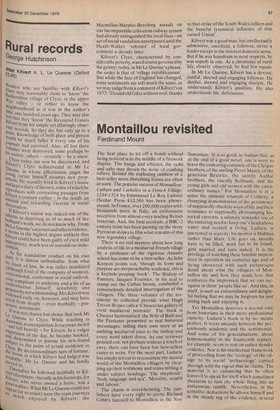Rural records
George Hutchinson
After Kilvert A. L. Le Quesne (Oxford £5.95)
te.aders who are familiar with Kilvert's .NiarY may reasonably claim to 'know' the Radnorshire village of Clyro, in the upper Wye valley — or rather to know the neighbourhood as it was in the author's ,linle, one hundred years ago. They may also feet that they 'know' the Reverend Francis KiNen from his simple yet alluringly observant records. So they do: but only up to a Point. Knowledge of both place and person Would be much fuller if every one of his Journals had survived. Also, all but three volumes were destroyed, some perhaps by his Widow, others — certainly — by a niece. , elyro today can now be discovered, and Quesne Clyro rediscovered in Mr Le ‘41tesne, in whose affectionate pages the Young curate himself assumes new prop°Ilions. He recently lived in Kilvert's house !nd kept a diary of his own, some of which he ;Produces with contrasting passages from 'ilvert a century earlier — in the result, an rsti,ansual and rewarding exercise in social -uservation. If Kilvert's widow was indeed one of the LealPrits in depriving us of so much of her '1:14.1sband's work, we do not know why. From i, rLe Quesne'saccountandotherevidence, seems in the highest degree unlikely that .ilvert could have been guilty of even mild InPropriety, much less of scandalous indiscretion.
„ As for scandalous conduct on his own Part, it is almost unthinkable: from what W( e know of him, he was rather straitlaced (although fond of the company of women), Conventional conformist in social outlook, rel. Compliant to authority and a bit of an authoritarian himself, sensibility and generosity notwithstanding. Mrs Kilvert was Widowed early on, however, and may have eted from deeply — even morbidly — possessive sentiments. I It was not chance,but choice that took Mr -Ae Quesne to Clyro. While teaching in `Itistraha, as an expatriate Jerseyman, he fell ; and fell heavily — for Kilvert. In a vulgar axnPdression of the day, he became hooked, s„, . determined to pursue his new-found nect to theoint of actual residence in ClYro. By • P the , an ,extraordinary turn of fortune, av noose in which Kilvert had lodged was ailable: Ineved i Mr Le Quesne and his family n. veThereafter he followed faithfully in Kilkirit'sfootsteps— literally in his footsteps, for gtevert. who never owned a horse, was a rena2 Walker. What Mr Le Quesne could not sor—at (or re-enact) were the train journeys nrinch enjoyed by Kilvert: the L Macmillan-Marples-Beeching assault on our incomparable criss-cross railway system had already extinguished the local lines —an act of social vandalism unsurpassed until the Heath-Walker 'reforms' of local government a decade later.
Kilvert's Clyro, characterised by considerable poverty, was of course governed by the gentry; today, in Mr Le Quesne's phrase, the order is that of 'village republicanism'. But while the face of England has changed, some sentiments are still much the same, as we may judge from a comment of Kilvert's in 1873: 'I found old Giles without coal, thanks to that strike of the South Wales colliers and the baneful tyrannical influence of that cursed Union'.
Kilvert was a good man, but intellectually submissive, uncritical, a follower, never a leader except in the strictest domestic sense. But if he was humdrum in most respects, he was superb in one. As a chronicler of rural life, closely observed, he had few equals.
In Mr Le Quesne, Kilvert has a devout, dutiful, shrewd and engaging follower. He dutiful, shrewd and engaging disciple. He understands Kilvert's qualities. He also understands his deficiences.






















































 Previous page
Previous page